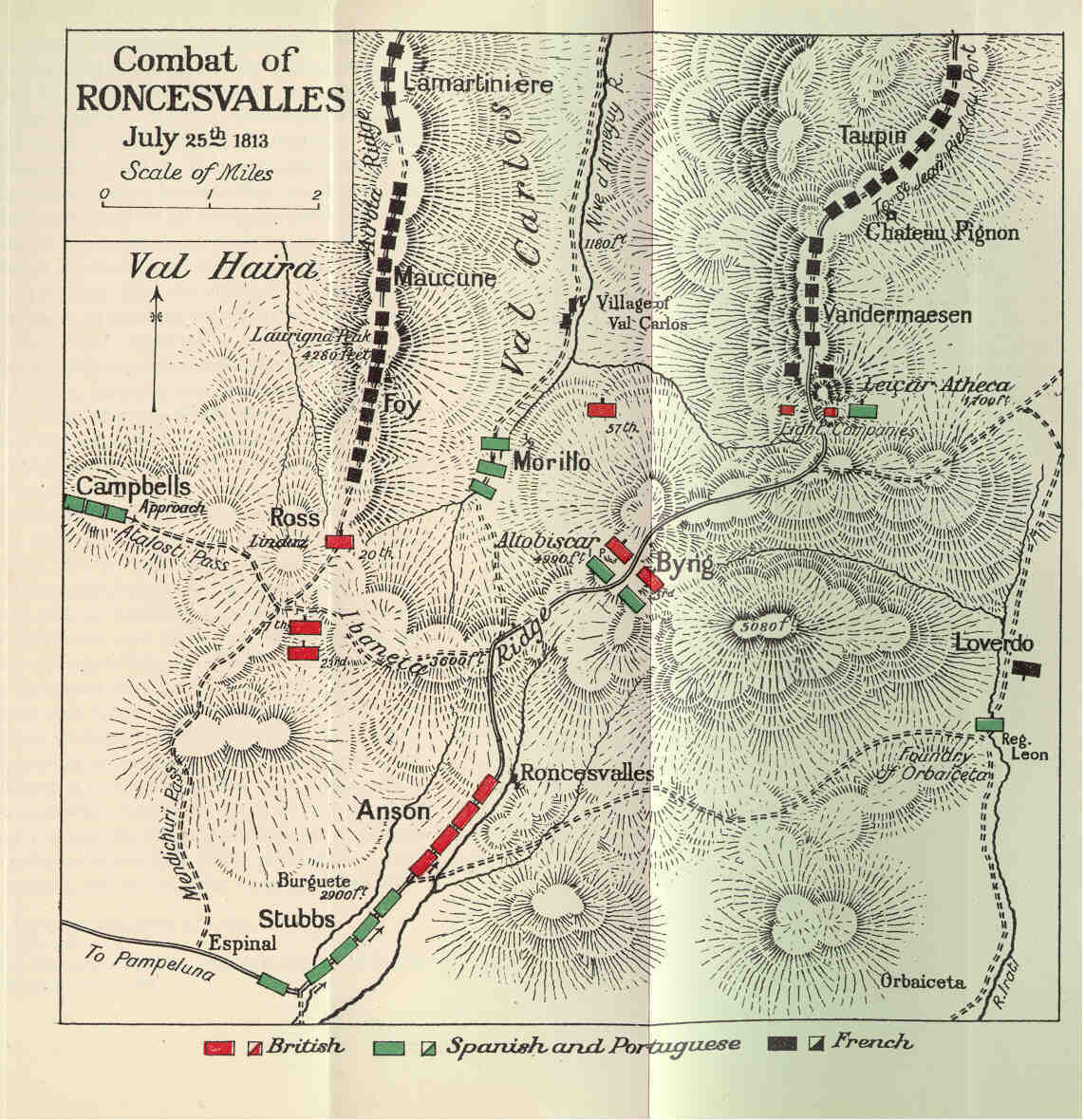Gentlemen
I will leave the Roland story for a Frenchman 

Roncesvalles, 25 July 1813
Following Wellington’s victory at Vitoria his Allied army pursued the retreating French towards the Franco-Spanish border. The French, however, still held the fortresses of San Sebastian and Pamplona. Wellington’s siege train was too small to carry out two sieges simultaneously, so he surrounded Pamplona.
. Marshal Nicolas Soult had been put in command of the French army in the Pyrenees on 12 July. He had rallied and reorganised the army that had been beaten at Vitoria, reinforcing it with troops from Bayonne and counter-attacked.
There were, according to Wellington, at least 70 passes across the Pyrenees that could be crossed by bodies of a few hundred troops. However, there were only four roads that a large army could use to cross them, three of which were in the western theatre of operations. The main one, which crossed the River Bidassoa, at Irun, was the furthest to the west. There were two roads from Pamplona to France. The Roman road, which crossed the Pyrenees at the pass of Roncesvalles, was the most easterly one. The other crossed at the pass of Maya.
As San Sebastian was in danger of falling, but Pamplona was not being attacked, Wellington expected Soult to demonstrate towards Maya and Roncesvalles, but to make his main attack along the Roman road.
Soult, however, concentrated his efforts against Maya and Roncesvalles. On 25 July 20,000 troops under General Jean-Baptiste Drouet, better known by his title of Count D’Erlon, attacked the 6,000 men at Maya . 40,000 men under Soult himself assaulted Sir Lowry Cole’s 13,000 British, Portuguese and Spanish troops at Roncevalles.
Soult attacked with three divisions along the Roman road and another three along a mule track to the west, each facing only one brigade, though Cole had two more in reserve. Soult’s main problem was that the pass was too narrow for him to fully exploit his advantage in numbers.
The attack along the Roman road was initially was halted by no more than 500 British and Spanish skirmishers, who were defending a frontage of only 300 yards and had plenty of cover.
The French columns eventually forced the Allies back along the Roman road. They were able to retreat to a strong defensive position, but in doing so opened up the possibility of them being outflanked to the east.
The narrow mule track went through partially wooded terrain, with a frontage of only 60 yards, meaning that only one battalion could fight at a time.
However, a thick fog descended at 4 pm. Cole, fearing that his force would be outflanked, decided to retreat, disobeying Wellington’s clear orders to hold even if there was a risk to his eastern flank.
Sir Rowland Hill had put Sir William Stewart in command of the two brigades at Maya. They fought fiercely, but had been badly deployed and were eventually forced back.
Hill arrived at Maya after the battle was over. He organised a successful retreat to a position that continued to block the road.
Wellington reached Hill’s position just before noon the next day, and was happy with Hill’s dispositions. No news was received from Cole until the evening. On hearing of the retreat from Roncevalles Wellington ordered Cole and Sir Thomas Picton to stand east of Zubiri. They had 19,000 men facing 40,000 French.
Early on 27 July Wellington learnt that Cole and Picton had continued to retreat. He described his generals as being:
‘really heroes when I am on the spot to direct them, but when I am obliged to quit them they are children.’
|


